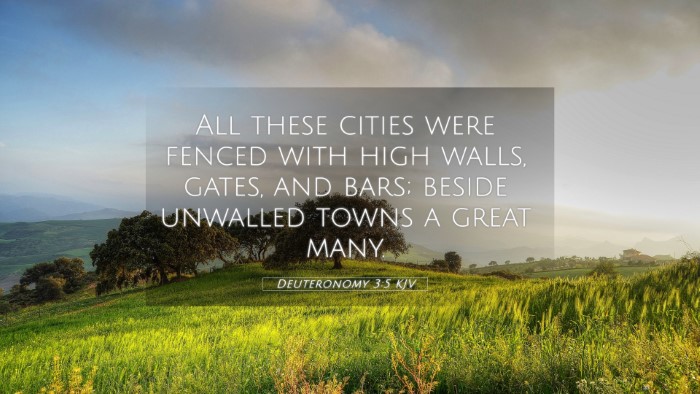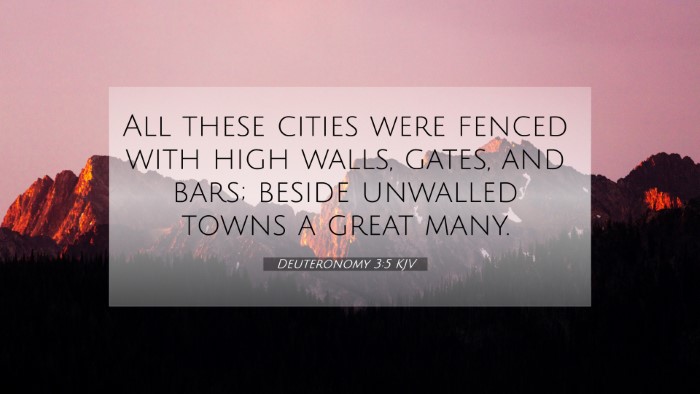Understanding Deuteronomy 3:5
Verse Context: Deuteronomy 3:5 states, "All these cities were fortified with high walls, gates, and bars, besides a great many unwalled towns." This verse highlights the military might and the fortified cities of the lands that the Israelites were about to conquer as they entered the Promised Land.
Insights from Public Domain Commentaries
Matthew Henry's Commentary
Matthew Henry emphasizes the preparedness and robustness of the cities of the Amorites, which reflects their strength and the challenge the Israelites faced. He notes that the fortifications symbolize the enemies' confidence in their own power, yet also foreshadow how trusting in the Lord can overcome formidable obstacles.
Albert Barnes' Notes on the Bible
Albert Barnes points out that the mention of these fortified cities serves to illustrate the “greatness” of God’s promise to Israel. The existence of these strongholds implies that the conquest is not merely a walk into a peaceful territory, but rather a significant task that requires divine assistance and strategy. Barnes argues that the fortified cities remind believers of the tangible and spiritual battles faced in life.
Adam Clarke's Commentary
Adam Clarke provides the insight that the description of the cities and their defenses indicates the physical reality of the Israelites' situation. The unwalled towns also show a contrast in vulnerability, which Clarke interprets as an opportunity for the Israelites to take both strong and weak places in their approach to conquest, suggesting a strategic advantage.
Summarized Meaning
Deuteronomy 3:5 depicts the fortified condition of the cities representing both literal and metaphorical barriers that believers face. The fortified towns exemplify the power of the opposition, while the unwalled towns signify areas that can be penetrated with faith and support from God. This verse serves as a reminder of how reliance on the divine can lead to victory in challenging situations.
Connections with Other Scriptures
Deuteronomy 3:5 is part of a larger narrative and has several cross-references throughout the Bible:
- Joshua 12:4-6: This passage discusses the kings and cities defeated by the Israelites, underlining their military efforts.
- 2 Corinthians 10:4: "For the weapons of our warfare are not carnal, but mighty through God to the pulling down of strongholds." This New Testament scripture parallels the battling of fortified cities with spiritual warfare.
- Psalms 48:12-14: This emphasizes the security of Jerusalem, paralleling the fortified nature of the cities mentioned in Deuteronomy.
- Hebrews 11:30: "By faith the walls of Jericho fell down, after they were compassed about seven days." This verse connects with the narrative of overcoming fortified structures through faith.
- Exodus 14:14: The Lord fights for you, encouraging reliance on divine assistance against strong foes.
- Romans 8:31: “If God be for us, who can be against us?” This speaks to the overarching theme of trust in God's protection amidst fortified resistance.
- Proverbs 21:31: "The horse is prepared against the day of battle: but safety is of the LORD." This proverb reinforces dependence on God over physical preparations.
Thematic Considerations
These cross-references showcase several themes:
- Faith in Divine Protection: Reliance on God against seemingly insurmountable odds.
- Strategic Warfare: The duality between physical and spiritual battles.
- Victory over Adversity: The assurance of triumph through faith.
- Preparation and Trust: The balance between earthly preparations and divine guidance.
Conclusion
In summary, Deuteronomy 3:5 serves as a powerful reminder of the challenges faced in the pursuit of God's promises. Through exploring the insights of various commentaries, this verse reveals the importance of faith, divine assistance, and the reality of spiritual warfare. The connections made with other scriptures further emphasize the continuity of these themes throughout the Biblical narrative.





